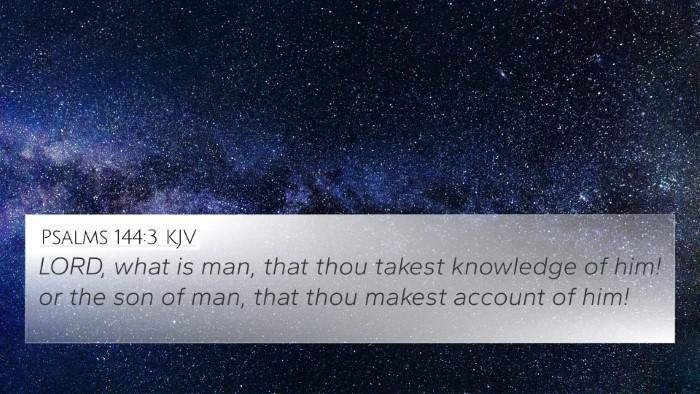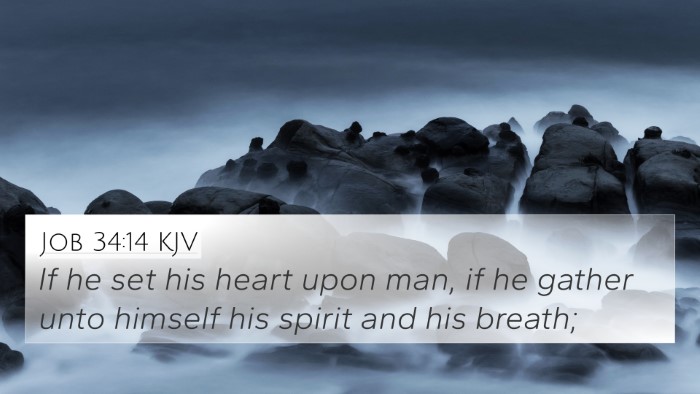Old Testament
Genesis Exodus Leviticus Numbers Deuteronomy Joshua Judges Ruth 1 Samuel 2 Samuel 1 Kings 2 Kings 1 Chronicles 2 Chronicles Ezra Nehemiah Esther Job Psalms Proverbs Ecclesiastes Song of Solomon Isaiah Jeremiah Lamentations Ezekiel Daniel Hosea Joel Amos Obadiah Jonah Micah Nahum Habakkuk Zephaniah Haggai Zechariah MalachiJob 7:17 Similar Verses
Job 7:17 Cross References
What is man, that thou shouldest magnify him? and that thou shouldest set thine heart upon him?
Uncover the Rich Themes and Topics of This Bible Verse
Listed below are the Bible themes associated with Job 7:17. We invite you to explore each theme to gain deeper insights into the Scriptures.
Job 7:17 Cross Reference Verses
This section features a detailed cross-reference designed to enrich your understanding of the Scriptures. Below, you will find carefully selected verses that echo the themes and teachings related to Job 7:17 KJV. Click on any image to explore detailed analyses of related Bible verses and uncover deeper theological insights.

Psalms 8:4 (KJV) »
What is man, that thou art mindful of him? and the son of man, that thou visitest him?

Hebrews 2:6 (KJV) »
But one in a certain place testified, saying, What is man, that thou art mindful of him? or the son of man that thou visitest him?

Psalms 144:3 (KJV) »
LORD, what is man, that thou takest knowledge of him! or the son of man, that thou makest account of him!

Job 34:14 (KJV) »
If he set his heart upon man, if he gather unto himself his spirit and his breath;

1 Samuel 24:14 (KJV) »
After whom is the king of Israel come out? after whom dost thou pursue? after a dead dog, after a flea.
Job 7:17 Verse Analysis and Similar Verses
Understanding Job 7:17
Bible Verse: "What is mankind that you make so much of them, that you give them so much attention?" - Job 7:17 (NIV)
Overview
Job 7:17 is a profound verse that encapsulates Job's struggle with his suffering and the nature of humanity in relation to God's attention. This verse reflects Job's lament and questions the purpose of human existence in the light of divine oversight.
Commentary Insights
-
Matthew Henry:
Henry emphasizes that Job is marveling at the significance God places on humanity, despite their frailty. He suggests this verse illustrates the mystery of God's care for humans, and how, in their suffering, they may wonder if they truly deserve such divine consideration.
-
Albert Barnes:
Barnes explains that Job articulates a feeling of insignificance amidst suffering. He reflects on the relationship between God's transcendence and humanity's mortality, questioning why God would take notice of human strife, thereby exploring themes of divine justice and human dignity.
-
Adam Clarke:
Clarke interprets this verse as a philosophical inquiry into human purpose. He notes that Job passionately raises questions about the value of life under distress, linking to the broader narrative of seeking understanding amid pain.
Thematic Connections
Job 7:17 serves as a focal point for various theological themes:
- The Nature of Suffering: This verse captures the essence of human suffering and the divine perspective on it.
- Human Significance: It prompts deep reflection on why God, the Creator, is concerned with the plight of humanity.
- The Search for Meaning: Job's questioning mirrors the existential search for meaning, especially in times of adversity.
Cross-References
Several scriptures resonate with the themes found in Job 7:17:
- Psalms 8:4-5: "What is mankind that you are mindful of them, human beings that you care for them?"
- Hebrews 2:6-7: "What is mankind that you are mindful of them... You made them a little lower than the angels."
- Isaiah 40:26: "Lift up your eyes and look to the heavens: Who created all these? He who brings out the starry host one by one, and calls forth each of them by name."
- James 4:14: "You are a mist that appears for a little while and then vanishes."
- Ecclesiastes 1:2: "'Meaningless! Meaningless!' says the Teacher. 'Utterly meaningless! Everything is meaningless.'"
- Matthew 10:31: "So don’t be afraid; you are worth more than many sparrows."
- Romans 8:18: "I consider that our present sufferings are not worth comparing with the glory that will be revealed in us."
Inter-Biblical Dialogue
The connections between Job 7:17 and other scriptures invite a rich dialogue across the Old and New Testaments:
- Similar themes of human fragility and divine care can be seen in both the Psalms and the Epistles.
- Job’s exploration of human meaning resonates broadly with Ecclesiastes' reflections on the vanity of life.
- The insights from Job pave the way for New Testament affirmations of worth and divine attention towards individuals.
Tools for Further Study
For those interested in deeper exploration of Scripture's interconnectedness, consider utilizing:
- Bible Concordance: Helpful for locating key terms and their occurrences.
- Bible Cross-Reference Guide: Assists in finding related verses.
- Bible Chain References: Useful for thematic studies, connecting various verses on a topic.
Conclusion
Job 7:17 serves as a significant reflection on the equality of man's suffering and the overarching attention from God. It encourages a deeper understanding of biblical texts through cross-referencing and highlights the rich interconnections throughout Scripture.



